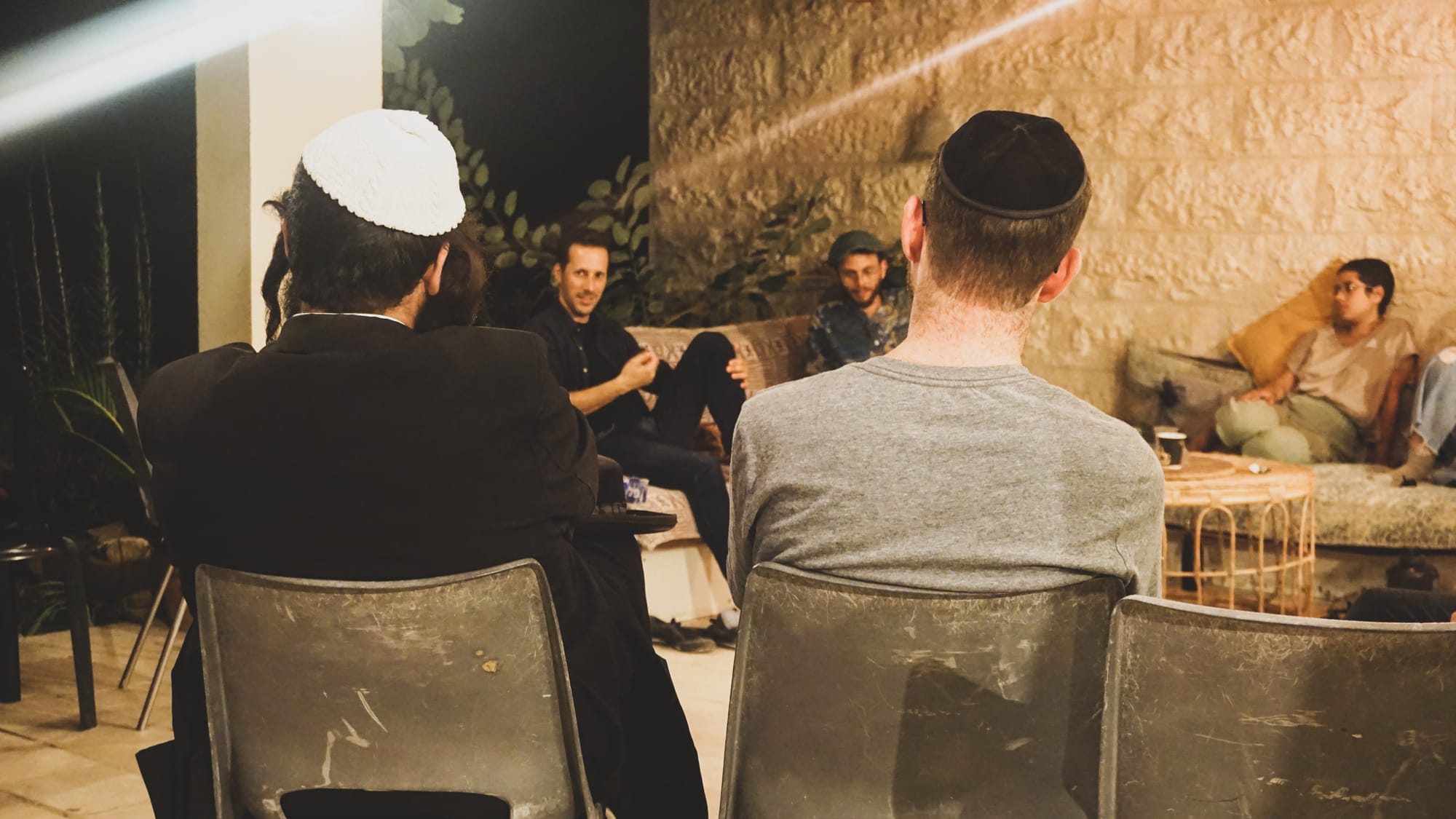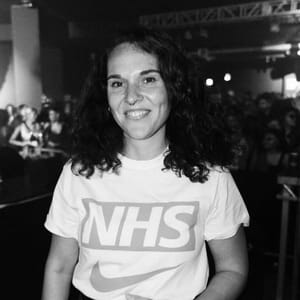Meet the religious Jews learning to resist Israel’s occupation
“This is the most important knowledge I’ve ever received.”

One August afternoon not long ago, as the sun dipped over the hills of the Palestinian town of Beit Jala in the occupied West Bank, a group of religious Jewish men faced the valley and sounded their shofar. They wore kippot and tzitzit, and stood next to a cluster of makeshift tents that had been erected hastily a few weeks before.
With the rapid expansion of illegal Jewish outposts across the West Bank under the shadow of the Gaza war, it would be fair to assume these men were hilltop youth settlers. But they were, in fact, members of Hamidrasha Haemonit, a group of religious Jewish activists committed to resisting the Israeli occupation. They had come to Beit Jala to stand in solidarity with the Palestinian Kisiya family, who had set up a female-led resistance camp to protest settler theft of their land.
The men hoped that by sounding the shofar, they could spark some form of dialogue with the settlers across the valley. And indeed, a few minutes later, the sound of a far-off horn rippled over the hills. Clearly, the settlers couldn’t resist the temptation to sound the ancient instrument synonymous with the Jewish tradition, even if it did mean communicating with the enemy.
As the notes drifted across the valley, the resistance camp laughed and clapped with the absurdity of it all. These two communities are living on two different planets, but this group of religious Jewish activists hopes to be the bridge that connects them.
Breaking Zionist narratives
A few weeks later, on a tranquil September evening, around 15 people gathered in the Spiritual Centre of Wahat as-Salam/Neve Shalom, a small binational village inside Israel. They were there to meet with the protagonist of Children of Peace, a 2022 documentary filmed there.
The village was jointly founded by Jewish and Palestinian citizens of Israel as a blueprint for peaceful shared living, and it’s often used as a base for educational work towards peace, equality and justice. Tonight, it’s the site of the closing weekend of a three-week seminar called the Freedom School of Faith, a pilot programme run jointly by three activist organisations: Combatants for Peace, Ir Amim and Breaking the Silence.
These NGOs have run programs for non-religious Israelis since 2019, aiming to teach young participants about the occupation – which they won’t learn about elsewhere – and give them the tools and community to take action. But this is their first time engaging with the religious community, which tends to be underrepresented in anti-occupation activism frameworks. The Freedom School of Faith aims to give religious Jews on break from yeshiva a holistic understanding of the mechanisms of the occupation and teach them how to resist it. Over the past three weeks, attendees have spent their days studying Jewish texts and analysing what they might have to say about Israeli policies. In the afternoons, they visited Palestinian villages in the West Bank, travelled to the Golan Heights, or met Bedouin villagers in the Negev/Naqab desert in southern Israel.
There’s a mixed group here tonight, ranging from moderately spiritual to ultra-Orthodox. Some grew up in settlements, and many had never heard the word “Nakba” before, let alone met a Palestinian. They’re deep in the process of unlearning truths they long considered gospel, and a 24-year-old from Jerusalem called Maria seems a little shell-shocked.
“I grew up in an open-minded religious family, and I always had questions about the Israeli-Palestinian conflict,” she says. “I knew I needed to learn more.”
One of the most impactful moments of the programme for Maria was her visit to Masafer Yatta, a cluster of villages in Area C of the West Bank whose inhabitants are harassed daily by the Israeli army and settlers. Following a recent wave of demolitions, Maria saw bulldozed homes with children’s clothes sticking out among the rubble, and destroyed schools with Arabic textbooks splayed on the ground. It was her first time seeing the occupation in action – and it was all through the eyes of the Palestinian people suffering it.
“Most Israelis think it [the occupation] is a narrative, but it’s not, it’s just fact,” she says. “This really opened my eyes to a different point of view. It’s changed my way of thinking, and the conversations I’ll have with my friends will be different. It’s the most important knowledge I’ve ever received.”
Yonatan, 27, stands out as the most visibly religious person here. He grew up in an ultra-Orthodox community in the centre of Israel. “I’m part of many different communities,” he says. “That includes settlers, ultra-Orthodox, and ultra-Orthodox anti-Zionists.”
Yonatan says he was already well on the political left before joining this seminar, but meeting more Palestinians in the West Bank eradicated any remaining doubts. “The seminar made me more of a radical leftist,” he says, “mainly because I saw a life I didn't know existed. I got more information about the occupation, its various methods of operation, and the Palestinian narrative that was hidden from me. The seminar pretty much broke the last Zionist narratives about the conflict that I still had.”
What’s just and merciful
Despite Judaism’s long tradition of radical activism, it’s rare to see religious Jews take part in resistance activities in Israel-Palestine today. Religious Zionists are the engine of the settler movement, while kippah-wearing ministers make land grabs official state policy. But Roye Kleitman, the founder of the Freedom School of Faith, wants to change all that.
Roye is about 5 ft 7 and speaks at about 100-miles-per-hour, with sandy hair and blue eyes that peer out over the top of his glasses to make sure you’re following.
Over the course of his life, Roye has encountered pretty much every corner of Israeli and Palestinian society and befriended everyone in it. He is one of the few people on this planet who has friends both in Palestinian cities and the settlements that overlook them.
He grew up in Jerusalem and went to a religious-Zionist boarding school in Petah Tikvah, near Tel Aviv. His yeshiva was conservative and ideological, but his parents were a little more liberal. “So I always had the gap between my values at home and the values of my school,” he explains.
Roye loved an adventure, so he found himself drawn to the group of boys who spent their weekends exploring the vast open lands in a place they called Judea and Samaria – what most people know as the Israeli-occupied West Bank. “It was cool on the hilltops,” Roye says. “For us it was kind of like a Woodstock festival. We saw ourselves as people with values. We felt superior to the people in Tel Aviv.”
In 2014, when Roye was 21, what had seemed like a video game became a reality. Three religious teenagers – Eyal Yifrach, Gilad Shaar, and Naftali Fraenkel – were kidnapped by Palestinians from the junction outside the settlement where Roye was studying, taken to the West Bank and killed. One of them went to Roye’s old school.
One week later, Roye was hitchhiking home with a friend. He took the first ride and left his friend to get the next, and started to panic a few hours later when he still hadn’t returned home. Roye soon discovered his friend had been the victim of a car ramming attack and was in hospital.
When Roye got to his bedside, his friend said: “What did we do to make them [Palestinians] hate us so much?” And that got Roye thinking.
The kidnapping and murder of the three Israeli boys led to the kidnapping and murder of 16-year-old Palestinian Mohammed Abu Khdeir, which triggered an avalanche of events that became the 2014 war in Gaza. Devastated, Roye was determined to do something to change this reality, and approached a sheikh in East Jerusalem to organise an interfaith prayer with his yeshiva.
“The sheikh put it on Zoom so people from Gaza could join,” Roye says. “And for me, it was crazy, because my friends were soldiers fighting there, and I realised I didn't know everything.”
That was the beginning of a long journey of connecting the unconnectable. Roye has an incredible talent for befriending and organising, and a knack for finding increasingly creative ways to bring communities who’ve never met together. Once he took a bus-load of Jewish Israelis to an Airbnb in Jericho and organised a party with Palestinians on Purim.
The Freedom School of Faith isn’t Roye's first foray into religious Jewish activism. Over the years, he’s run countless seminars and initiatives aimed at educating Israelis about the occupation, specifically within the communities he grew up in: ultra-Orthodox, religious Zionists and settlers. He founded Hamidrasha Haemonit after 7 October because he understood he needed to fight for the identity of Judaism; the Freedom School of Faith is a natural progression, aimed at providing religious Jewish communities with an introduction and entry into activism.
Roye’s politics is rooted in the tenets and teachings of Judaism. His belief is if God wants all people to do what is just and merciful, and if all people are created in the image of God and deserve to be treated with dignity and respect, then the Jewish people really shouldn’t be the perpetrators of occupation and apartheid.
A crisis of faith
Mia Biran is the Israeli program manager for Combatants for Peace, one of the three NGOs that oversees the Freedom School of Faith. She says it’s no coincidence the project was launched in the months following 7 October: it’s designed to tap into the disillusionment of religious Jews who are losing their faith in the Zionist dream and looking for answers – but have very few places to turn for guidance.
“There is a crisis of faith in the religious public right now,” Mia says. “And we need to offer something if we don’t want all those people to go to [Israeli National Security Minister Itamar] Ben Gvir.”
The intention is to provide spiritual guidance, a home and community. “I joined them on a seminar and it’s a very unique experience,” Mia continues. “They took Jewish content and related it to criticism of the occupation, the Jewish people as occupiers, and relations between the majority and the minority, not just now but in ancient times.”
Although this was just a pilot, the programme has proven such a success that Combatants for Peace plans to launch another in the coming months. “It’s not just important for religious people; it’s important for everyone,” Mia says. “It’s so important that all Israelis meet Palestinians to hear their experiences and see their realities. And with the Freedom School of Faith, we’re building a community around it.”
For the organisers, the more diverse the participants’ beliefs and backgrounds, the better. This summer, one of the attendees was the daughter of the head of a Jewish settlement. “She came with her own lived experiences and value system,” Mia says. “And after our programme, that changed completely.” ▼
Alice Austin is a freelance journalist covering culture, subculture, and the intersection of politics and music.
Author

Alice Austin is a freelance journalist covering culture, subculture, and the intersection of politics and music.
Sign up for The Pickle and New, From Vashti.
Stay up to date with Vashti.



